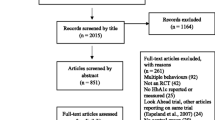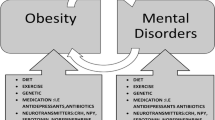Abstract
Purpose of Review
Among adults with type 2 diabetes (T2D), cognitive behavioral therapy (CBT), acceptance and commitment therapy, and mindfulness interventions have demonstrated improvement in depression, anxiety, and glycemic control. We assessed whether these treatment modalities have shown usefulness in adolescents with T2D or at risk for T2D.
Recent Findings
Data are limited on the use of the abovementioned therapeutic interventions and include only adolescent girls at risk for T2D. CBT was as useful as health education sessions. At 1 year, greater decreases in depression, insulin resistance, and BMI were observed in girls randomized to mindfulness compared with CBT groups.
Summary
Given the positive outcome of mindfulness intervention in adults and in adolescent girls at risk for T2D, future studies should involve males at risk for T2D, and adolescents diagnosed with T2D. Longer interventions and booster meetings for maintenance should be studied.
Similar content being viewed by others
References
Papers of particular interest, published recently, have been highlighted as: • Of importance •• Of major importance
Lascar N, Brown J, Pattison H, Barnett AH, Bailey CJ, Bellary S. Type 2 diabetes in adolescents and young adults. Lancet Diabetes Endocrinol. 2018;6:69–80.
Pinhas-Hamiel O, Zeitler P. Acute and chronic complications of type 2 diabetes mellitus in children and adolescents. Lancet. 2007;369:1823–31.
Group TS, Wilfley D, Berkowitz R, Goebel-Fabbri A, Hirst K, Ievers-Landis C, et al. Binge eating, mood, and quality of life in youth with type 2 diabetes: baseline data from the today study. Diabetes Care. 2011;34:858–60.
Silverstein J, Cheng P, Ruedy KJ, Kollman C, Beck RW, Klingensmith GJ, et al. Depressive symptoms in youth with type 1 or type 2 diabetes: results of the Pediatric Diabetes Consortium Screening Assessment of Depression in Diabetes Study, vol. 38; 2015. p. 2341–3.
Hood KK, Beavers DP, Yi-Frazier J, Bell R, Dabelea D, McKeown RE, et al. Psychosocial burden and glycemic control during the first 6 years of diabetes: results from the SEARCH for Diabetes in Youth study. J Adolesc Health. 2014;55:498–504.
Perrin NE, Davies MJ, Robertson N, Snoek FJ, Khunti K. The prevalence of diabetes-specific emotional distress in people with Type 2 diabetes: a systematic review and meta-analysis, vol. 34; 2017. p. 1508–20.
Katz LL, Anderson BJ, McKay SV, Izquierdo R, Casey TL, Higgins LA, et al. Correlates of medication adherence in the TODAY cohort of youth with type 2 diabetes, vol. 39; 2016. p. 1956–62.
Pinhas-Hamiel O, Levy-Shraga Y. Eating disorders in adolescents with type 2 and type 1 diabetes. Curr Diab Rep. 2013;13:289–97.
Baseline data from the TODAY study. Binge Eating, Mood, and quality of life in youth with type 2 diabetes. Diabetes Care. 2011;34:858–60.
Nip ASY, Reboussin BA, Dabelea D, Bellatorre A, Mayer-Davis EJ, Kahkoska AR, et al. Disordered eating behaviors in youth and young adults with type 1 or type 2 diabetes receiving insulin therapy: the SEARCH for Diabetes in Youth Study, vol. 42; 2019. p. 859–66.
Segal ZV, Dimidjian S, Beck A, Boggs JM, Vanderkruik R, Metcalf CA, et al. Outcomes of online mindfulness-based cognitive therapy for patients with residual depressive symptoms: a randomized clinical trial. JAMA Psychiat. 2020;77:563–73.
. Kaar JL, Schmiege SJ, Drews K, Higgins J, Walders-Abramson N, Isganaitis E, et al. Evaluation of the longitudinal change in health behavior profiles across treatment groups in the TODAY clinical trial, vol. 21; 2020. p. 224–32. This is a very important work; it shows that high-quality lifestyle intervention had little effect on improving health behavior profiles in adolescents with T2D and thus revealing the serious problem we face
Beck AT. Cognitive therapy. A 30-year retrospective. Am Psychol. 1991;46:368–75.
Ellis A. A cognitive approach to behavior therapy. Int J Psychiatry. 1969;8:896–900.
. Beck AT. A 60-year evolution of cognitive theory and therapy. Perspect Psychol Sci. 2019;14:16–20 In this article, Aaron Beck who invented the CBT, touches some of the highlights of his 60 years in psychiatry and mental health, and the evolution of cognitive theory and therapy.
Uchendu C, Blake H. Effectiveness of cognitive–behavioural therapy on glycaemic control and psychological outcomes in adults with diabetes mellitus: a systematic review and meta-analysis of randomized controlled trials, vol. 34; 2017. p. 328–39.
Hayes SC. Acceptance and commitment therapy, relational frame theory, and the third wave of behavioral and cognitive therapies - republished article. Behav Ther. 2016;47:869–85.
Gregg JA, Callaghan GM, Hayes SC, Glenn-Lawson JL. Improving diabetes self-management through acceptance, mindfulness, and values: a randomized controlled trial. J Consult Clin Psychol. 2007;75:336–43.
Cardel MI, Ross KM, Butryn M, Donahoo WT, Eastman A, Dillard JR, et al. Acceptance-based therapy: the potential to augment behavioral interventions in the treatment of type 2 diabetes. Nutr Diabetes. 2020;10:3.
Maghsoudi Z, Razavi Z, Razavi M, Javadi M. Efficacy of acceptance and commitment therapy for emotional distress in the elderly with type 2 diabetes: a randomized controlled trial. Diabetes Metab Syndr Obes. 2019;12:2137–43.
Shayeghian Z, Hassanabadi H, Aguilar-Vafaie ME, Amiri P, Besharat MA. A randomized controlled trial of acceptance and commitment therapy for type 2 diabetes management: the moderating role of coping styles. PLoS One. 2016;11:e0166599.
Crane RS, Brewer J, Feldman C, Kabat-Zinn J, Santorelli S, Williams JM, et al. What defines mindfulness-based programs? The warp and the weft. Psychol Med. 2017;47:990–9.
Perry-Parrish C, Copeland-Linder N, Webb L, Sibinga EMS. Mindfulness-based approaches for children and youth. Curr Probl Pediatr Adolesc Health Care. 2016;46:172–8.
Greeson JM, Chin GR. Mindfulness and physical disease: a concise review. Curr Opin Psychol. 2019;28:204–10.
Carpenter R, DiChiacchio T, Barker K. Interventions for self-management of type 2 diabetes: an integrative review. Int J Nurs Sci. 2019;6:70–91.
Medina WL, Wilson D, de Salvo V, Vannucchi B, de Souza EL, Lucena L, et al. Effects of mindfulness on diabetes mellitus: rationale and overview. Curr Diabetes Rev. 2017;13:141–7.
Noordali F, Cumming J, Thompson JL. Effectiveness of mindfulness-based interventions on physiological and psychological complications in adults with diabetes: a systematic review. J Health Psychol. 2017;22:965–83.
Fanning J, Osborn CY, Lagotte AE, Mayberry LS. Relationships between dispositional mindfulness, health behaviors, and hemoglobin A1c among adults with type 2 diabetes. J Behav Med. 2018;41:798–805.
Armani Kian A, Vahdani B, Noorbala AA, Nejatisafa A, Arbabi M, Zenoozian S, et al. The impact of mindfulness-based stress reduction on emotional wellbeing and glycemic control of patients with type 2 diabetes mellitus. J Diabetes Res. 2018;2018:1986820–0.
Gulley LD, Shomaker LB, Kelly NR, Chen KY, Stice E, Olsen CH, et al. Indirect effects of a cognitive-behavioral intervention on adolescent weight and insulin resistance through decreasing depression in a randomized controlled trial. J Pediatr Psychol. 2019;44:1163–73.
Shomaker LB, Kelly NR, Pickworth CK, Cassidy OL, Radin RM, Shank LM, et al. A randomized controlled trial to prevent depression and ameliorate insulin resistance in adolescent girls at risk for type 2 diabetes. Ann Behav Med. 2016;50:762–74.
Shomaker LB, Kelly NR, Radin RM, Cassidy OL, Shank LM, Brady SM, et al. Prevention of insulin resistance in adolescents at risk for type 2 diabetes with depressive symptoms: 1-year follow-up of a randomized trial. Depress Anxiety. 2017;34:866–76.
Annameier SK, Kelly NR, Courville AB, Tanofsky-Kraff M, Yanovski JA, Shomaker LB. Mindfulness and laboratory eating behavior in adolescent girls at risk for type 2 diabetes. Appetite. 2018;125:48–56.
Pivarunas B, Kelly NR, Pickworth CK, Cassidy O, Radin RM, Shank LM, et al. Mindfulness and eating behavior in adolescent girls at risk for type 2 diabetes. Int J Eat Disord. 2015;48:563–9.
Shomaker LB, Pivarunas B, Annameier SK, Gulley L, Quaglia J, Brown KW, et al. One-year follow-up of a randomized controlled trial piloting a mindfulness-based group intervention for adolescent insulin resistance. Front Psychol. 2019;10:1040 □ This work summarizes previous works on interventions in girls at risk for type 2 diabetes, and the impact of mindfulness intervention compared with CBT.
Shomaker LB, Bruggink S, Pivarunas B, Skoranski A, Foss J, Chaffin E, et al. Pilot randomized controlled trial of a mindfulness-based group intervention in adolescent girls at risk for type 2 diabetes with depressive symptoms. Complement Ther Med. 2017;32:66–74.
Skoranski A, Kelly NR, Radin RM, Thompson KA, Galescu O, Demidowich AP, et al. Relationship of mindfulness to distress and cortisol response in adolescent girls at-risk for type 2 diabetes. J Child Fam Stud. 2018;27:2254–64.
Dalager SL, Annameier S, Bruggink SM, Pivarunas B, Coatsworth JD, Schmid AA, et al. Mindfulness-based group intervention for an adolescent girl at risk for type 2 diabetes: a case report. Adv Mind Body Med. 2018;32:9–17.
Berk KA, Buijks HIM, Verhoeven AJM, Mulder MT, Ozcan B, van 't Spijker A, et al. Group cognitive behavioural therapy and weight regain after diet in type 2 diabetes: results from the randomised controlled POWER trial. Diabetologia. 2018;61:790–9.
Tovote KA, Schroevers MJ, Snippe E, Emmelkamp PMG, Links TP, Sanderman R, et al. What works best for whom? Cognitive behavior therapy and mindfulness-based cognitive therapy for depressive symptoms in patients with diabetes. PLoS One. 2017;12:e0179941–1.
Author information
Authors and Affiliations
Corresponding author
Ethics declarations
Conflict of Interest
Orit Pinhas-Hamiel is a section editor for Current Diabetes Reports. Daniel Hamiel declares no potential conflicts of interest.
Human and Animal Rights and Informed Consent
This article does not contain any studies with human or animal subjects performed by any of the authors.
Additional information
Publisher’s Note
Springer Nature remains neutral with regard to jurisdictional claims in published maps and institutional affiliations.
This article is part of the Topical Collection on Pediatric Type 2 and Monogenic Diabetes
Rights and permissions
About this article
Cite this article
Pinhas-Hamiel, O., Hamiel, D. Cognitive Behavioral Therapy and Mindfulness-Based Cognitive Therapy in Children and Adolescents with Type 2 Diabetes. Curr Diab Rep 20, 55 (2020). https://doi.org/10.1007/s11892-020-01345-5
Accepted:
Published:
DOI: https://doi.org/10.1007/s11892-020-01345-5




